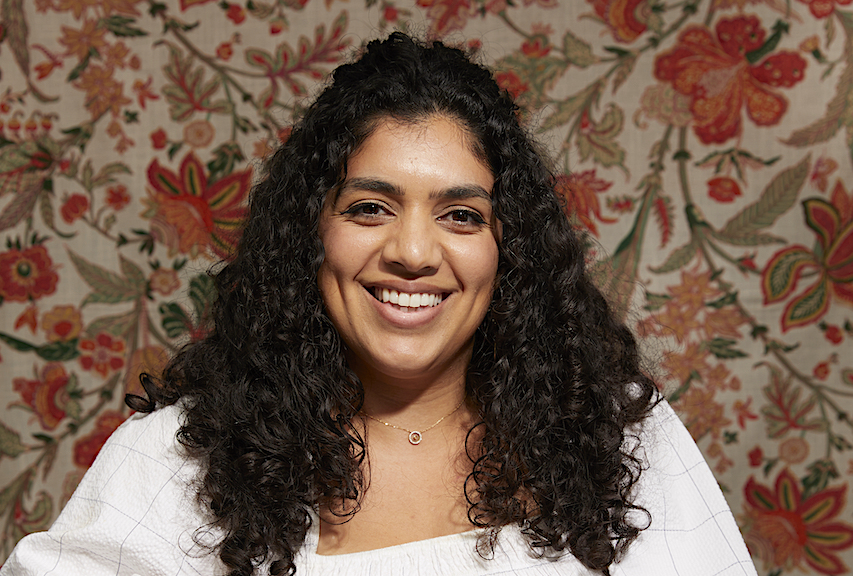Dina is joining us as a guest performer in September. A rising star in the food world, British-born Omani-Zanzibari chef Dina Macki explores the unique foodscape of Oman in the first Omani cookbook written by an Omani person. The proposal for her debut cookbook Bahari, published by DK won her the prestigious Jane Grigson Trust Award for New Food and Drink Writers 2023 Find out more about her book here and try out two sample recipes, courtesy of the publisher.
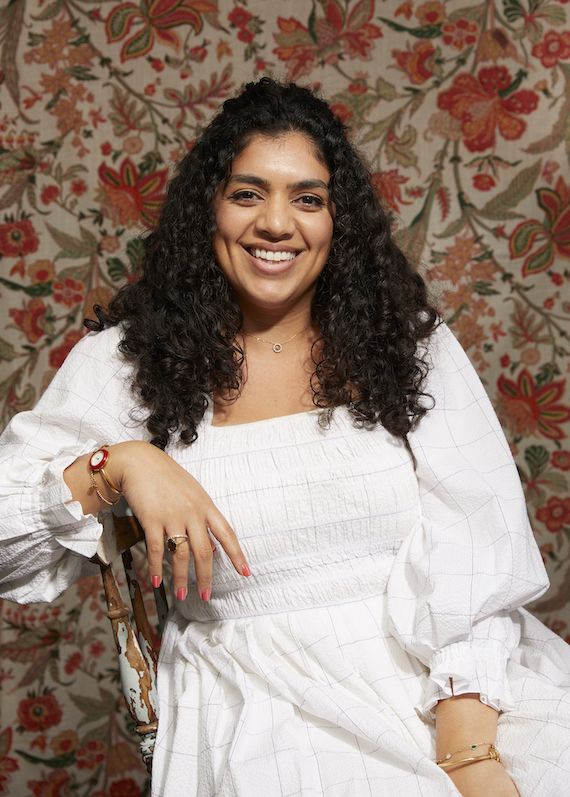
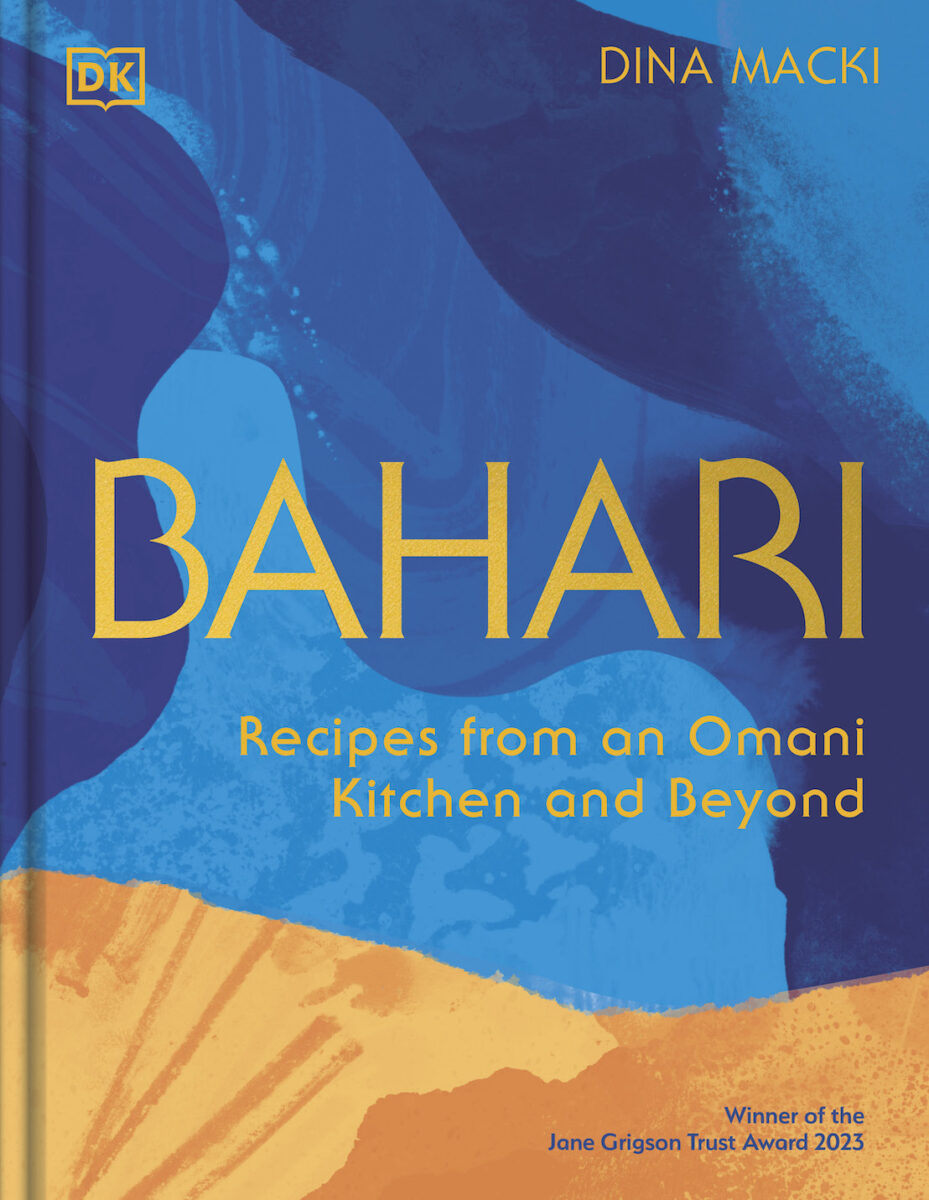
‘Dina’s vivacious spirit shines through every plate she cooks. Her dishes are equal parts personal and cultural and truly bring to life the diversity offered by the beautiful land and people of Oman.’ Noor Murad
Dina Macki is a chef, recipe developer, food writer, and presenter. She has quickly garnered over 52k followers on Instagram and works with British and international brands across socials and TV to present and develop recipes, including Waitrose, Tesco’s, Cuisinart, Middle East Eye, Vita Coco, and Tastemade. She has written for gal-dem magazine, Pit magazine, BBC Good Food magazine, and appeared on Channel 4 Sunday Brunch.
Dina was born and raised in the coastal town of Portsmouth which is home to a thriving and close-knit Omani community who immigrated there along with the Sultan of Zanzibar during the revolution.
Bahari, meaning ‘ocean’ in Swahili, is a culinary exploration of the rich flavours and the deep history of her people, a culture shaped by boundless coastlines and complex maritime history with origins and influences spanning Pakistan, Iran, India, the Swahili coast, and Portugal.
In this distinctive cookbook, Macki travels across Oman and Zanzibar, unearthing regional delicacies and recreating the food of her heritage. With 100 recipes for meat, fish, and vegetables, homemade breads and dips, desserts and drinks and with recipes like her Auntie Dalia’s Mutahfy, Qashod, Mama’s Coconut Dhal, Machboos and Za’atar & Garlic Focaccia, Macki invites us into her kitchen, showing us how to create exquisite Omani dishes at home.
Combining personal essays and contemporary twists on traditional recipes, Bahari takes us through the flavours of Oman, in a tale that is as fascinating as it is delicious. This striking book offers a blend of narrative nonfiction, travel photography, family history, and of course recipes, to tell a story about food and identity, displacement and migration, and ultimately how food will always connect us to where we come from.
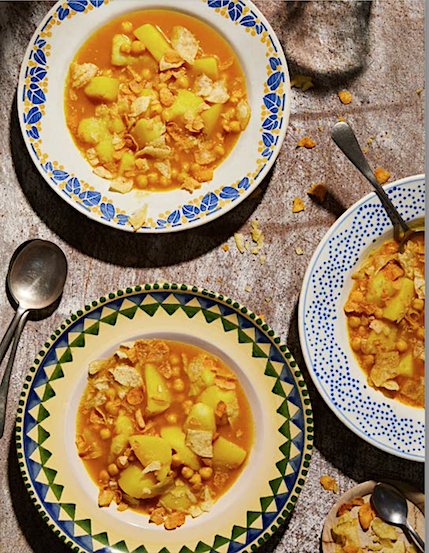
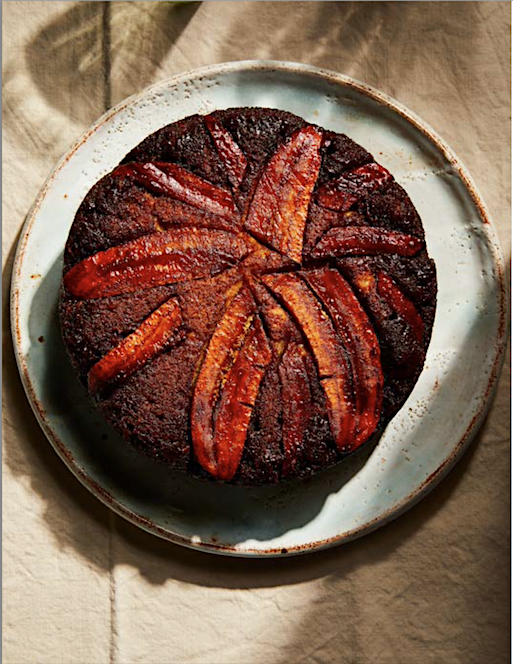
Sample Recipes to give you a flavour of the recipes in BAHARI (click on titles below)
Sample recipes to give you a flavour of what’s in store in BAHARI
Zanzibari Turmeric, Lemon, Potato & Chickpea Broth
Serves 4
INGREDIENTS
2 tbsp olive oil
2 tbsp plain (all-purpose) flour
1 tsp garlic powder (optional)
1 tbsp ground turmeric
2 whole red chillies
salt, to taste
4 potatoes, peeled and chopped
into 6–8 pieces
400g (14oz) can of chickpeas juice of 1–2 lemons
1 tbsp tamarind paste (optional)
Optional garnishes
cornflakes salt-and-vinegar crisps sev or Bombay mix
Growing up, my cousins and I would call this recipe “yellow potatoes”; none of us could pronounce the Swahili name, and back then, we wanted it to sound “normal”. This has to be our most famous street-food meal in Zanzibar. It’s a very simple recipe, yet elite within the community. To help tourists, it’s now known as “Zanzibar mix”.
The concept behind this soup is that you layer it according to your cravings. So you start with your base of potato soup, then choose from a selection of Zanzibari snacks to include in it, such as bajiyas (mung bean falafels), meat skewers, kachori (potato balls), tamarind water or paste, chilli sauce, coconut and coriander chutney and, to top it off, shredded cassava crisps. I add every single element possible, dropping them in and mixing it around before slurping away.
Making all these extra parts can be time consuming, though; my mum tells me that when she worked for the Royal Oman Police, she and her cousin Suki would round up their friends every week and they’d all bring in one element. They’d set up shop in the office as soon as they arrived at 7am, and have this for their breakfast. Since she moved to England, she’s continued the same concept, getting all the women in the family to prepare a part for our gatherings, and creating our own food stall inside the house.
I make this constantly, especially in the winter, as it’s so easy and comforting. I got into the habit of adding chickpeas, just to give it an extra dimension. While I don’t always have the extra elements at my disposal, I do mimic the crunchy cassava by sprinkling over some Bombay mix or a mixture of cornflakes with salt-and-vinegar crisps!
METHOD
In a large saucepan, combine the oil, flour, garlic powder and turmeric over a medium heat, whisking together to form a paste. Slowly pour in about 200ml of water, whisking as you go to stop any lumps from forming.
Increase the heat to high, then pour in another 800ml of water, followed by the chillies. Season with salt and bring to the boil.
Once it’s bubbling, add the potatoes. If your water looks red, add a dash of lemon – the turmeric needs acidity to stay yellow. Leave the potatoes to cook for 15–20 minutes, then add the chickpeas. The water should just cover the potatoes; you don’t want too much, as it will take a lot longer to thicken.
Cook for a further 10 minutes, then add the lemon juice and taste for seasoning, adding more salt if needed. At this point, you can add the tamarind paste, if you like. If not, you can add some extra lemon if you want it more acidic. For me, the more lemon, the better!
Sprinkle on your chosen garnishes and serve.
Plantain or Banana, Coconut & Cardamom Cake
Serves 6–8
INGREDIENTS
160g plantain or banana, puréed, plus 1 sliced
200g plain (all-purpose) flour
2 tsp baking powder 80g caster (superfine) sugar
80g soft light brown sugar
100g desiccated (dried, shredded) coconut
3 eggs
185ml vegetable oil
10 cardamom pods, crushed,
or 1 tbsp ground cardamom
For the caramel
100g soft light brown sugar
3 tbsp unsalted butter
Ever since I was little, Bibi and my mum have been adamant that I had to enjoy all of our home cooking, but until I was about 16, I refused to eat any dishes that looked too “different”, and especially avoided anything with an overwhelming taste of cardamom. I couldn’t stand the spice, which was really unhelpful, because almost every single recipe of ours included it.
There is one particular pudding from Zanzibar called ndizi mbivu, which is basically overripe sweet plantains stewed with coconut milk and cardamom. As a kid, the look of the dish always put me off – it looked messy, unlike all the pretty, quintessentially British puddings I was used to seeing. Much to Bibi’s dismay, I would compare it to baby food and always turn up my nose at it. I must have been about 20 when I started to appreciate it and understand how something so simple could yield so much comfort and flavour.
Now, I see the warmth of the cardamom and the creaminess of the coconut is bliss, and I’ve included my version on page 141. However, I also wanted to include this “prettier” version: the version that let me feel as if I fitted in, and as if our food made sense. Bringing all the same ingredients into a cake seemed like the perfect way for others to relate to how comforting ndizi mbivu is for us. Even my mum and Bibi enjoy this version with a cup of tea.
METHOD
Preheat the oven to 200°C (180°C fan/400°F/Gas 6). Grease a 20cm (8in) cake tin and line with baking parchment (parchment paper).
To make the caramel, place the sugar in a saucepan over a low–medium heat and allow it to gradually melt, gently swirling the pan to help ensure all the sugar melts evenly. Once it has all melted, add the butter and keep stirring until smooth.
Arrange the sliced banana or plantain in the base of the prepared tin, then pour over the caramel. Set aside.
Combine all the remaining ingredients together in a large bowl and whisk until fully incorporated and smooth, but don’t over-whisk.
Pour the batter into the tin over the sliced banana or plantain and caramel. Bake for 20 minutes, then reduce the oven temperature to 190°C (170°C fan/375°F/Gas 5) and bake for a further 25 minutes until a skewer inserted into the middle comes out clean.
Leave to cool in the tin for about 10 minutes, then remove from the tin. I like to serve this warm, but if you prefer you can leave it to cool entirely – just be sure to remove from the tin while it’s still warm. This will keep for 4–5 days in an airtight container.

Festival Guests will be doing book signings at the Book-ish stand in the Market Hall and at The Castle.

